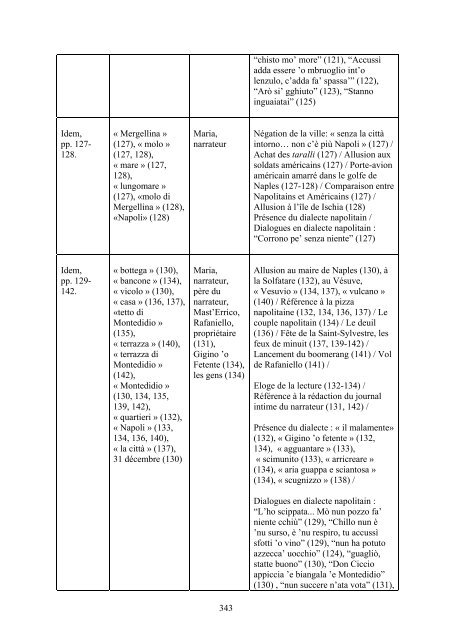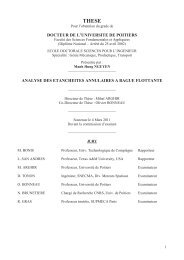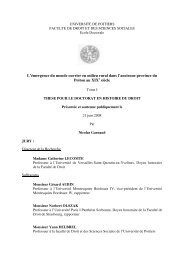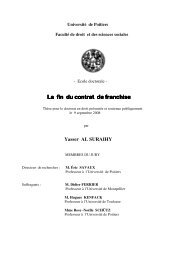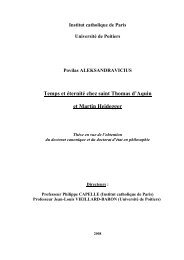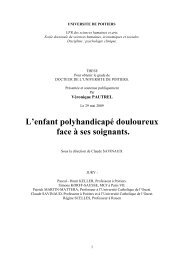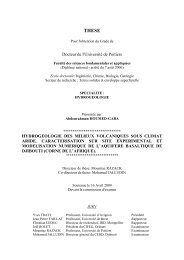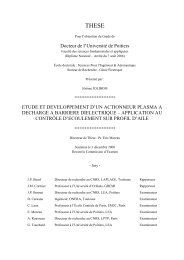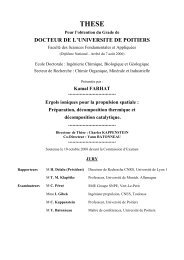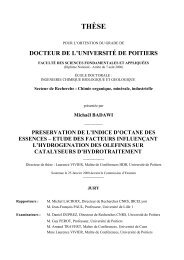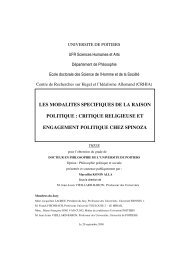- Page 1:
Université de Poitiers UFR Lettres
- Page 5 and 6:
Napoli è sommersa, nascosta, cance
- Page 7 and 8:
Qu’en est-il en tout cas de cette
- Page 9 and 10:
éalité » a aussi pour objet de t
- Page 11 and 12:
Le dernier chapitre « L’œuvre p
- Page 14 and 15:
1.1 Une ville aux mille facettes 1.
- Page 16 and 17:
fastueux centre ville est achevé.
- Page 18 and 19:
1.1.4 Une ville surpeuplée et affa
- Page 20 and 21:
cavallo a cui si chiede un numero a
- Page 22 and 23:
sacrifice de son aïeule dans une r
- Page 24 and 25:
parle des quatre ou cinq journées
- Page 26 and 27:
1.2 Le climat littéraire de l’ap
- Page 28 and 29:
Quasi che si direbbe che per scrive
- Page 30 and 31:
garde napolitaine. Ce n’est pourt
- Page 32 and 33:
1.2.6 Les jeunes écrivains napolit
- Page 34 and 35:
essayerons de cerner, chez d’autr
- Page 36 and 37:
Domenico Rea et Michele Prisco tent
- Page 38 and 39:
1.3 Le réalisme de Domenico Rea 37
- Page 40 and 41:
économique dramatique. Selon lui,
- Page 42 and 43:
échapper à ses origines. En appar
- Page 44 and 45:
considérées comme des êtres natu
- Page 46 and 47:
la parodie d’une éducation qui c
- Page 48 and 49:
Ainsi, on joue constamment entre ru
- Page 50 and 51:
En 1943, Naples et les petites vill
- Page 52 and 53:
e napoletani eran diventati cittadi
- Page 54:
quotidien. Il n’y a pas de fractu
- Page 57 and 58:
1.4.2 Topographie d’une ville mal
- Page 59 and 60:
de personnes. L’écrivain s’att
- Page 61 and 62:
La plebe dall’informe faccia riem
- Page 63 and 64:
Le deuxième exemple de « recita
- Page 65 and 66:
Après avoir décrit le regard que
- Page 67 and 68:
seule journée, le jour de Noël ;
- Page 69 and 70:
Intorno, come selvaggi uccelli bian
- Page 71 and 72:
s’éloignant du ventre de la vill
- Page 74 and 75:
1.5 Raffaele La Capria : l’homme
- Page 76 and 77:
Le rapport avec Naples devient ains
- Page 78 and 79:
egard collectif et méprisant des j
- Page 80 and 81:
Si lasciano andare al rutto, al pet
- Page 82 and 83:
la société des loisirs. Naples,
- Page 84 and 85:
L’amorce de la phrase suivante en
- Page 86 and 87:
Le roman annonce également la disp
- Page 90:
II - Erri De Luca et Naples 89
- Page 93 and 94:
les beaux quartiers. Toute son écr
- Page 95 and 96:
Voilà le quotidien de Erri De Luca
- Page 97 and 98:
Chiaia. Les promenades au bord de m
- Page 99 and 100:
seguito, non ho avuto più alcun de
- Page 101 and 102:
l’adresse dans l’art de la pêc
- Page 103 and 104:
102
- Page 105 and 106:
Erri De Luca enfant est encore frap
- Page 107 and 108:
Non, il n’y a pour lui rien à vo
- Page 109 and 110:
premier livre. Non ora, non qui, pu
- Page 111 and 112:
Luca est parti soldat 1 en Albanie
- Page 113 and 114:
ejeté par ses camarades d’école
- Page 115 and 116:
Nei miei anni d’infanzia mi soffo
- Page 117 and 118:
autres. Sur quelle prise de conscie
- Page 119 and 120:
Erri De Luca ne dort pas la nuit, e
- Page 121 and 122:
120
- Page 123 and 124:
nero con case e paesini imbiancati.
- Page 125 and 126:
mia mente quel rinnovo periodico de
- Page 127 and 128:
Au zoo, les animaux sont comme ses
- Page 129 and 130:
de filles à qui jouer la comédie,
- Page 131 and 132:
les rues, ils demandent ou proposen
- Page 133 and 134:
achète ses électeurs de même que
- Page 135 and 136:
134
- Page 137 and 138:
à coup ses études, sa famille, sa
- Page 139 and 140:
Così da ragazzo guardai dalla sua
- Page 141 and 142:
enoue avec la ville-sirène à trav
- Page 143 and 144:
Vingt-sept ans après Il mare non b
- Page 145 and 146:
Bien sûr, la jeune fille l’a aim
- Page 147 and 148:
Le départ est une fuite, mais il p
- Page 149 and 150:
148
- Page 151 and 152:
gauche. En tant que militant, il pa
- Page 153 and 154:
ans 1 . Il est venu là sans rêves
- Page 155 and 156:
3.1.4 L’équilibre retrouvé Afin
- Page 157 and 158:
Désormais parfaitement en harmonie
- Page 159 and 160:
Sofri, Giorgio Pietrostefani, Ovidi
- Page 161 and 162:
Mi so reduce dall’autunno dell’
- Page 163 and 164:
162
- Page 165 and 166:
seul, en quête d’évasion et de
- Page 167 and 168:
d’un égout. Lorsqu’il l’a tr
- Page 169 and 170:
3.2.4 De la Sicile à la Tanzanie D
- Page 171 and 172:
aux drogués 1 . Erri De Luca trave
- Page 173 and 174:
allora il balcone della casa di Nap
- Page 175 and 176:
Il peut s’agir aussi d’élémen
- Page 177 and 178:
Toute la famille sur le quai « sal
- Page 179 and 180:
178
- Page 181 and 182:
3.3.1 De Naples à l’alpinisme No
- Page 183 and 184:
Sono uno del sud, uno che sale con
- Page 185 and 186:
maturité, l’expression d’une q
- Page 187 and 188:
ces années de son intimité 1 . La
- Page 189 and 190:
mitonne comme un pot sur le feu à
- Page 191 and 192:
edécouvre son quartier d’enfance
- Page 193 and 194:
3.3.10 Conclusion En conclusion, no
- Page 195 and 196:
194
- Page 197 and 198:
196
- Page 199 and 200:
4.1.2 Sources et réalisations Nous
- Page 201 and 202:
« Io mi sono avvelenato (coi libri
- Page 203 and 204:
Deux des quatre récits de I colpi
- Page 205 and 206:
d’aspetta’. ” “Pure don Pet
- Page 207 and 208:
Dans Napòlide, publié en 2006, la
- Page 209 and 210:
Stu popolo se sceta (si sveglia) na
- Page 211 and 212:
étreintes, baisers, corps à corps
- Page 213 and 214:
mort comme le fait si bien Anna Mar
- Page 215 and 216:
4.1.10 Réalité ou « recita » ?
- Page 217 and 218:
L’autre exemple que nous présent
- Page 219 and 220:
Ma basta con questa commedia, tutti
- Page 221 and 222:
écriture, l’emploi du dialecte.
- Page 223 and 224:
222
- Page 225 and 226:
« La mia patria è la lingua itali
- Page 227 and 228:
’O italiano (l’italiano) è na
- Page 229 and 230:
“Stiamo in Italia, dice babbo, ma
- Page 231 and 232:
Le pêcheur encore s’exprime en n
- Page 233 and 234:
A comme: «ammore» 1 , «ammuina»
- Page 235 and 236:
Les mots les plus récurrents dans
- Page 237 and 238:
léger, à l’italien, caractéris
- Page 239 and 240:
Tu, mio (1998) Tre cavalli (1999) L
- Page 241 and 242:
Ce tableau qui tient compte aussi d
- Page 243 and 244:
anastrophe 4 , isomorphisme spatial
- Page 245 and 246:
A Napoli c’è una via dritta e un
- Page 247 and 248:
246
- Page 249 and 250:
Lexique concernant ses activités p
- Page 251 and 252:
qu’il n’est pas le fils de ses
- Page 253 and 254:
SAL VA TO RE E E E … Mentre lo ri
- Page 255 and 256:
Céline 1 , qui lui semble exhaler
- Page 257 and 258:
vedere tutte le cose della strada
- Page 259 and 260:
croit deviner, dans les racines d
- Page 261 and 262:
narrateur écoute la voix de Caia,
- Page 263 and 264:
On analyse dans ce passage à la fo
- Page 265 and 266:
aussi les tragédies perpétrées p
- Page 267 and 268:
de la supériorité de Sainte Patri
- Page 269 and 270:
On peut également évoquer le sang
- Page 271 and 272:
La città che da ragazzo mi sembrò
- Page 273 and 274:
Sono rimasto inerte, nel tempo, ai
- Page 275 and 276:
noir 1 . De plus, l’écrivain a u
- Page 277 and 278:
C’est bien là qu’il a connu da
- Page 279 and 280:
foix très douce 1 et coléreuse 2
- Page 281 and 282:
obscurs de la ville de son enfance,
- Page 283 and 284:
pourquoi il écrit, lit et traduit
- Page 285 and 286:
Ero un ragazzo di città, ma d’es
- Page 287 and 288:
L’escalade qu’il pratique est u
- Page 289 and 290:
Lui mi dette la sua mano lenta, dis
- Page 291 and 292:
290
- Page 293 and 294: qui prétendent à représenter Nap
- Page 295 and 296: l’enfant et l’homme, entre l’
- Page 297 and 298: Solo andata, Milano, Feltrinelli, 2
- Page 299 and 300: Ouvrages critiques sur Erri De Luca
- Page 301 and 302: ESPOSITO Edoardo, A proposito della
- Page 303 and 304: Émission de télévision Bell’It
- Page 305 and 306: écriture 7, 8, 9 10, 22, 25, 26, 2
- Page 307 and 308: vicolo, ruelle 9,10, 37, 39, 56, 57
- Page 309 and 310: Résumé L’œuvre de Erri De Luca
- Page 311 and 312: 310
- Page 313 and 314: Récits non napolitains ayant que l
- Page 315 and 316: L’Interregno, p. 93. I capricci d
- Page 317 and 318: Capodimorte, p. 111. La rapina di C
- Page 319 and 320: occhiali, p. 15. Interno familiare,
- Page 321 and 322: Chapitre II, pp. 18-38. (3, 4, 14),
- Page 323 and 324: Chapitre V, pp. 75-98. golfo» (55)
- Page 325 and 326: Chapitre IX, pp. 152-169. Chapitre
- Page 327 and 328: Idem, pp. 10- 18. Idem, pp. 16- 17.
- Page 329 and 330: Idem, pp. 70- 71. Idem, pp. 72- 75.
- Page 331 and 332: • Aceto, arcobaleno (1992) Livre
- Page 333 and 334: Fogli della domenica, p. 111. In al
- Page 335 and 336: Farse, p. 49. Mille lire, p. 71. Na
- Page 337 and 338: Idem, p. 56-60. Idem, p. 62- 114.
- Page 339 and 340: Montedidio, p. 7-21. Idem, p. 22. I
- Page 341 and 342: Idem, pp. 74-82. Idem, pp. 83-84. I
- Page 343: « Natale » (103, 126), « mezzogi
- Page 347 and 348: pp. 92-95. Noël 1956 refus de la v
- Page 349 and 350: • Napòlide (2006) Récit, pages
- Page 351 and 352: Nervi, pp. 35-39. Commedie, pp. 40-
- Page 353 and 354: Calcio, pp. 62-65. La parola patria
- Page 355 and 356: Paesaggio, pp. 79-80. Pescare, pp.
- Page 357 and 358: 356
- Page 359 and 360: Plan 1 358
- Page 361 and 362: Plan 2 360
- Page 363 and 364: Plan 4 362
- Page 365 and 366: Plan 6 364
- Page 367 and 368: 1968 Départ de Naples 1968 - 1976
- Page 369 and 370: 1989 Non ora, non qui 1991 Una nuvo
- Page 371 and 372: pescatori nell’Antico e nel Nuovo
- Page 373 and 374: 1944 Rafle des Juifs de Rome par le
- Page 375 and 376: 374
- Page 377 and 378: 25-26 juillet 1970 : À Turin, prem
- Page 379 and 380: 1976 : Fondation de Prima Linea par
- Page 381 and 382: 380
- Page 383 and 384: 1992 1993 1994 1995 1997 Aceto, arc
- Page 385 and 386: 2000 2001 Un papavero rosso all’o
- Page 387 and 388: 2003 2004 ____________________ Bagn
- Page 389 and 390: 2007 Errri De Luca, Gianmaria Testa
- Page 391 and 392: 1991 1992 1993 1994 Una nuvola come
- Page 393 and 394: 1999 2000 2001 Tufo Edizioni Librer
- Page 395 and 396:
2003 2005 2006 ____________________
- Page 397 and 398:
396
- Page 399 and 400:
A 8.1 Non ora, non qui (1989) 398
- Page 401 and 402:
Non ora, non qui Feltrinelli 1989 U
- Page 403 and 404:
A8.2 Lettere a Francesca (1990) 402
- Page 405 and 406:
Un nuage comme tapis, Rivages, 1994
- Page 407 and 408:
Acide, arc- en ciel, Rivages, 1994
- Page 409 and 410:
A8.6 In alto a sinistra (1994) 408
- Page 411 and 412:
A8.7 Pianoterra (1995) 410
- Page 413 and 414:
- En 2008, aux éditions Nottetempo
- Page 415 and 416:
Alzaia présente deux images diffé
- Page 417 and 418:
A8.9 Tu, mio (1998) 416
- Page 419 and 420:
A8.10 Tre cavalli (1999) 418
- Page 421 and 422:
Tableau récapitulatif de la public
- Page 423 and 424:
A8.12 Un papavero rosso all’occhi
- Page 425 and 426:
- en français 424
- Page 427 and 428:
A8.14 Lettere da una città bruciat
- Page 429 and 430:
A8.16 Opere sull’acqua (2002) 428
- Page 431 and 432:
A8.17 Il contrario di uno (2003) 43
- Page 433 and 434:
- en Folio, chez Gallimard 432
- Page 435 and 436:
A8.18 L’ultimo viaggio di Sindbad
- Page 437 and 438:
A8.20 Sulla traccia di Nives (2005)
- Page 439 and 440:
A8.21 Solo andata (2005) 438
- Page 441 and 442:
A8.23 In nome della madre (2006) 44
- Page 443 and 444:
A8.24 Chisciotte e gli invincibili
- Page 445 and 446:
444
- Page 447 and 448:
DV : L’éditeur français de Non
- Page 449 and 450:
DV : J’ai traduit Un papavero ros
- Page 451 and 452:
• Dédicace de Napòlide 450
- Page 453 and 454:
solitudine nei suoi ritorni. Sparge
- Page 455 and 456:
• Carte postale de Erri De Luca R
- Page 457:
456


